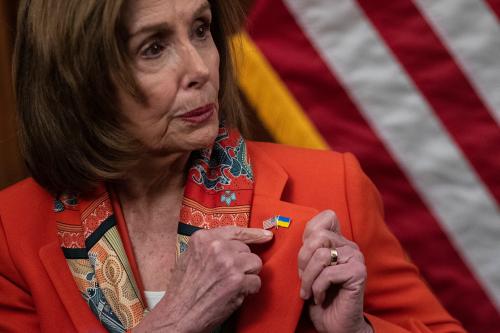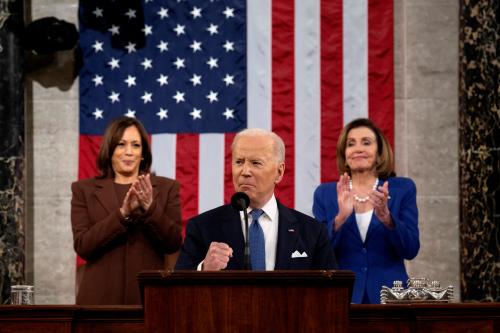Russia’s invasion of Ukraine has united the American people across partisan, ideological, and demographic lines. They mostly agree about how the U.S. government should respond, and they are in no mood to compromise with Vladimir Putin.
The Economist/YouGov survey recently posed detailed questions to a random sample of Americans about how the United States should be reacting to Russia’s actions. Here’s a summary of how registered voters answered.

The pattern is clear—Americans are in favor of steps that will help the Ukrainians to defend themselves, but they are averse to measures that might draw the United States directly into the conflict. President Biden has drawn a line between defending our NATO allies and fighting for Ukraine, and most Americans seem to agree with him.
On balance, the American people think we haven’t responded firmly enough to Russia. About half of registered voters think we should get tougher, compared to one in ten who think we’ve been too harsh and two in ten who think our response has been about right. A Pew Research Center survey released on March 15 found similar results.
The question is which additional steps the people would support. They are ambivalent about establishing a no-fly zone over Ukraine. They narrowly favor the concept, 41% to 33%. But they oppose shooting down Russian planes over Ukraine, which is what establishing a non-fly zone would probably require. My guess is that a majority of Americans do not see a distinction between jet aircraft and other weapons we have already provided the Ukrainians and would favor sending Polish jets to Ukraine, even if the United States were involved in the transfer. Regrettably, public opinion surveys have not yet posed this question.
One thing is clear—the American people are in no mood to placate Vladimir Putin, even to end the current war or avert a wider one. By huge margins, they oppose steps such as promising Russia that Ukraine will never join NATO, allowing Russia to enjoy greater influence in countries that were part of the former Soviet Union, and rolling back NATO troop deployments in Eastern Europe.
Across party lines, Americans now see Russia’s invasion as a serious threat to American interests. As recently as January, only one-quarter of Americans viewed the prospect of a Russian invasion of Ukraine in this way. The events of the last month have doubled this number. But for the overwhelming majority, Ukraine has become a moral issue as well. They see Ukraine as a beleaguered democracy under attack from an autocrat who wants to restore the borders of the Soviet Union. They believe that Ukrainians identify as a distinct people, not as Russians artificially separated from the Motherland, and that they want to remain independent, not to reunite with Russia. They believe that Russian forces are deliberately targeting civilians and that Vladimir Putin is guilty of war crimes.
Americans have instinctively taken Ukraine’s side and hope that it will win the war, but they are not optimistic that this will happen. Only 14% think that Ukraine is winning the war, and just 24% expect that Ukraine will still be an independent country a year from now. If the American people come to believe that their government has failed to do everything it could to prevent Ukraine’s defeat, we could experience a repetition of the poisonous “Who lost China?” debate of the late 1940s and early 1950s.
The Brookings Institution is committed to quality, independence, and impact.
We are supported by a diverse array of funders. In line with our values and policies, each Brookings publication represents the sole views of its author(s).







Commentary
The invasion of Ukraine unites the American people against Russia and Putin
March 16, 2022